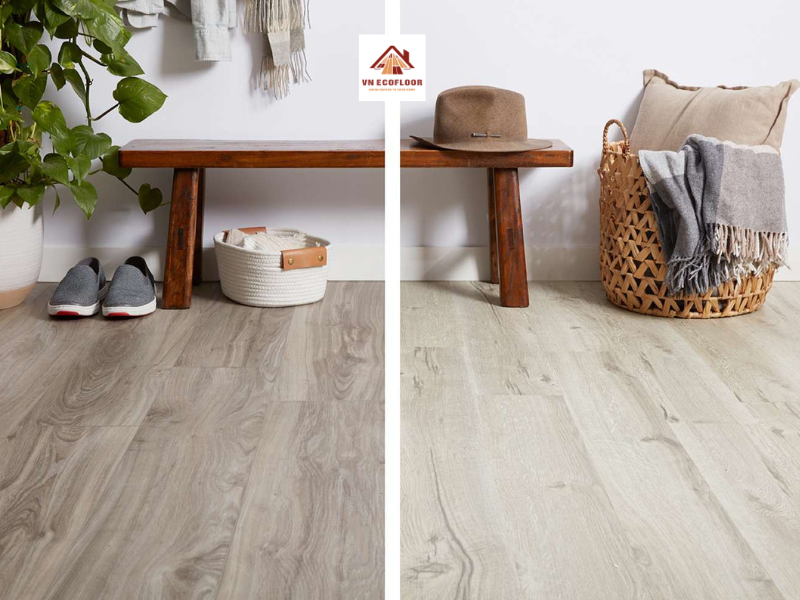When it comes to flooring choices, Luxury Vinyl Plank (LVP) and tiles are among the most popular, each offering distinct advantages and disadvantages. Here’s a comprehensive comparison to help you determine which option best suits your needs:
LUXURY VINYL PLANK (LVP) FLOORING
Advantages:
- Aesthetic Appeal
- Realistic Designs: Faithfully replicates the appearance of natural wood and stone.
- Wide Variety: Available in an extensive range of colors, textures, and patterns.
- Installation
- DIY-Friendly: Easily installed with a click-lock system, ideal for DIY enthusiasts.
- Versatile: Can be laid over most existing floors without the need for adhesives or nails.
- Comfort
- Soft Underfoot: Provides a more comfortable walking surface compared to tiles.
- Warmth: Feels warmer underfoot than ceramic or porcelain tiles.
- Maintenance
- Low Maintenance: Requires minimal upkeep—just regular sweeping and occasional mopping.
- Waterproof: 100% waterproof, making it perfect for moisture-prone areas like kitchens and bathrooms.
- Durability
- Scratch and Stain Resistant: Stands up well to scratches, stains, and general wear.
- Cost
- Affordable: Generally more budget-friendly than ceramic or porcelain tiles, both in terms of material and installation.
Disadvantages:
- Longevity
- Lifespan: Typically, LVP has a shorter lifespan compared to tiles.
- Appearance Over Time
- Fading: May fade when exposed to direct sunlight for extended periods.
- Resale Value
- Perception: Often considered less premium than ceramic or porcelain tiles, which may impact resale value.
TILES (CERAMIC AND PORCELAIN)
Advantages:
- Durability
- Long Lifespan: Extremely durable, capable of lasting for decades with proper care.
- Resistance: Highly resistant to scratches, stains, and wear.
- Aesthetic Versatility
- Variety: Offers a wide range of colors, patterns, and finishes.
- Premium Appearance: Often regarded as a more upscale flooring option.
- Maintenance
- Easy to Clean: Simple to maintain and resistant to most chemicals.
- Hygienic: Non-porous surfaces prevent mold and mildew growth.
- Water Resistance
- Waterproof: Ideal for bathrooms, kitchens, and other wet areas due to high water resistance.
- Heat Resistance
- Heat Tolerant: Can withstand high temperatures, making it suitable for underfloor heating systems.
- Resale Value
- High Value: Enhances the resale value of a home due to its perceived quality and durability.
Disadvantages:
- Installation
- Complex Installation: Requires professional installation, which can be time-consuming and costly.
- Preparation: Proper subfloor preparation is crucial to prevent issues like cracking.
- Comfort
- Hard Underfoot: Can be uncomfortable to stand on for long periods.
- Cold: Feels colder underfoot compared to LVP, particularly in cooler climates.
- Maintenance
- Grout Lines: Grout can stain and requires periodic sealing and cleaning to maintain its appearance.
- Cost
- Expensive: Generally more costly than LVP in terms of both material and installation.

SUMMARY
Luxury Vinyl Plank (LVP) flooring is an excellent choice for those seeking an affordable, easy-to-install, and comfortable flooring option that offers a realistic wood or stone appearance and is 100% waterproof. It’s ideal for DIY projects and provides a warm, soft underfoot experience.
On the other hand, tiles (ceramic and porcelain) are perfect for those who value durability, longevity, and a premium aesthetic. They are highly water-resistant and heat-resistant, adding significant value to a property, but they do come with higher material and installation costs and require professional installation.
Ultimately, choosing between LVP and tiles depends on your specific needs, budget, and the environment in which the flooring will be installed. Both options offer unique benefits and potential drawbacks, so weigh these factors carefully to make the best decision for your space.

